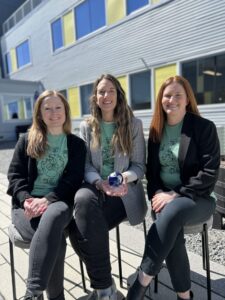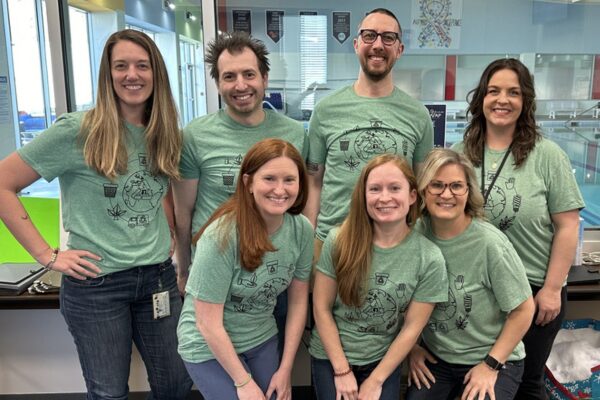The New England Center for Children’s (NECC) Green Committee is an example of how a small group of like-minded individuals can have a big impact on their community.
“The mission of the Green Committee is simple: we want to increase sustainability practices across all organizational operations, and we really want to embed this as part of the workplace culture here,” shared Kelly McConnell, PhD, BCBA-D, LABA, director of ACE training and client relations.
The Green Committee started in 2017 with a group of people who had a strong interest in reducing NECC’s carbon footprint. “As a large and well-known human service organization, we feel that we are obligated to the folks that we work with, the individuals that we serve, and the broader community in which we are a part to do what we can to decrease our carbon footprint and save the planet,” McConnell added. “We really use that core mission to guide everything we do from the practical initiatives to the more focused research with the hope that … others will follow suit.”
The many ideas shared at the Green Committee’s first meeting have resulted in meaningful actions across NECC’s Southborough campus, beginning with replacing Styrofoam containers with compostable ones in the cafeteria and increasing recycling initiatives across the organization. This included setting up a recycling center in the Arledge Student Center, adding a textile bin at the Downey Center for Child Development, and helping make NECC events more sustainable.
“We have many initiatives here at the school, but the biggest one is the single stream recycling program,” shared Julie LeBlanc-Dunnigan, MS, BCBA, LABA, vocational specialist. “However, there are a lot of other items that are recyclable, but they can’t go into the single stream bins. So, we have several different programs that we participate in and we have systems in place to help us collect and process those items, such as plastic bags and wrap, oral care products, school and office supplies, and clothing and textiles.”
LeBlanc-Dunnigan shared that Massachusetts is one, if not the only, state where throwing clothing and textiles into the landfill is illegal. Since the textile bin, which also doubles as a fundraiser for NECC, was added to the Downey Center lot, the Green Committee has collected over 4,700 pounds of clothing and textiles, and raised close to $300.
For clothing and shoes that still have life left in them, the Committee has created a Caring Closet for use by staff and students. There is also an Office Supply Hub where staff can share extra office supplies, both located in the Student Center.
“My favorite initiative, which has also been popular with staff, are the supply swaps,” shared Meghan Reidy, MS, director of compliance. “We’ve done a number of classroom and office supply swaps mostly tied to clean outs, and it’s been a great opportunity to get things out there that would end up in the landfill otherwise. We’ve had some specialty ones like plant swaps, winter supply swaps, and child and caregiver item swaps, all initiated by NECC staff outside of the Green Committee.”
The Green Committee’s efforts are catching on at NECC. According to Reidy, people are reaching out when they have ideas, want to think more sustainably. Reidy shared that a number of groups at NECC have started reaching out for the Committee’s assistance with recycling at events, such as Field Day, the NECC 5K Walk/Run for Autism, and smaller on-campus events like Bagel Days and the Health Fair.
The Committee wouldn’t be able to keep up with this demand without the help of the students. According to LeBlanc-Dunnigan, the Vocational Department has worked these efforts into vocational opportunities for students. Every day, NECC Southborough students collect recycling from the bins throughout the building, including offices, classrooms, and communal areas, and in the evening, one of the consumers from the Adult Services program removes recycling from all the areas that the students are unable to access during the day like conference rooms and staff lounges.
“It’s an important job and we’re really excited to have our students participate in that,” said LeBlanc-Dunnigan, adding that they also help with the specialized recycling initiatives, and dropping those items off to the locations where they need to go to into the community. “Weekly or bi-weekly, we have students take the clothing and textiles to the recycling bin at the day care, the big bags of plastic and plastic wrap to the local supermarkets, and they redeem cans and bottles for us. We could not keep up without all of their help.”
 And it wouldn’t be a true NECC project without a research element. In October 2023, NECC received the BABAT “Behavior Change for a Sustainable World” award in recognition of the Green Committee’s dedication to using applied behavior analysis (ABA) principles to encourage sustainable practices across the organization.
And it wouldn’t be a true NECC project without a research element. In October 2023, NECC received the BABAT “Behavior Change for a Sustainable World” award in recognition of the Green Committee’s dedication to using applied behavior analysis (ABA) principles to encourage sustainable practices across the organization.
“When we won the award, our formal research project was in its infancy,” shared McConnell. “Fast forward to many data collection sessions later, we have a nice set of outcomes that we’re really excited about. We’ve started to present some of this internally to NECC audiences as well as at professional conferences.”
McConnell shared that the team is in the process of writing up their results with the hopes of publishing them in one of the major behavior analytic journals and sharing what they’ve learned. They’re also working on policies and procedures to share with NECC staff to help them think more sustainably.
“It’s really thinking how we can have a more long-term impact across the entire community,” shared Reidy. “I think there’s more people bringing reusable items to work or using a mug from their office instead of a paper cup. That extends beyond these walls, and people might be doing that in other places as well. I think that’s really great.”

